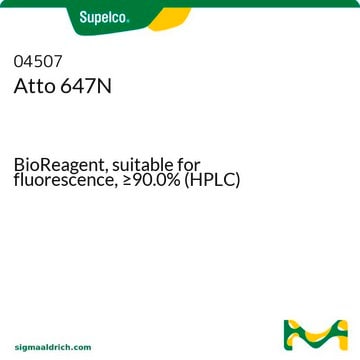95349
Atto 647N amine
BioReagent, suitable for fluorescence
Sign Into View Organizational & Contract Pricing
All Photos(1)
About This Item
UNSPSC Code:
12352116
NACRES:
NA.32
Recommended Products
product line
BioReagent
assay
≥90% (HPLC)
form
solid
mol wt
Mw 801 g/mol
manufacturer/tradename
ATTO-TEC GmbH
λ
in ethanol (with 0.1% trifluoroacetic acid)
UV absorption
λ: 640-646 nm Amax
suitability
suitable for fluorescence
storage temp.
−20°C
General description
Atto 647N is a superior red-emitting label with high molecular absorption (150.000) and quantum yield (0.65) as well as sufficient stoke′s shift. Atto 647N is characterized by a high thermal and photostability.
Absorption and fluorescence are independent of pH, at least in the most relevant range of pH 4 to 11. The amine derivative may be used for reactions with activated carboxy-groups like NHS-esters, TFP-esters etc.
Absorption and fluorescence are independent of pH, at least in the most relevant range of pH 4 to 11. The amine derivative may be used for reactions with activated carboxy-groups like NHS-esters, TFP-esters etc.
Storage Class
11 - Combustible Solids
wgk_germany
WGK 3
flash_point_f
Not applicable
flash_point_c
Not applicable
ppe
Eyeshields, Gloves, type N95 (US)
Certificates of Analysis (COA)
Search for Certificates of Analysis (COA) by entering the products Lot/Batch Number. Lot and Batch Numbers can be found on a product’s label following the words ‘Lot’ or ‘Batch’.
Already Own This Product?
Find documentation for the products that you have recently purchased in the Document Library.
Marina I Giannotti et al.
Biomacromolecules, 12(7), 2524-2533 (2011-05-25)
Nanopharmaceutics composed of a carrier and a protein have the potential to improve the activity of therapeutical proteins. Therapy for lysosomal diseases is limited by the lack of effective protein delivery systems that allow the controlled release of specific proteins
S E D Webb et al.
Optics express, 16(25), 20258-20265 (2008-12-10)
We combine single molecule fluorescence orientation imaging with single-pair fluorescence resonance energy transfer microscopy, using a total internal reflection microscope. We show how angles and FRET efficiencies can be determined for membrane proteins at the single molecule level and provide
STED microscopy to monitor agglomeration of silica particles inside A549 cells.
Schubbe, S., et al.
Advanced Engineering Materials, 12, 417-422 (2010)
Harpreet Singh et al.
Mitochondrion, 12(2), 230-236 (2011-10-11)
The visualization and quantification of mitochondria-associated proteins with high power microscopy methods is of particular interest to investigate protein architecture in this organelle. We report the usage of a custom-made STimulated Emission Depletion (STED) fluorescence nanoscope with ~30nm lateral resolution
A novel nanoscopic tool by combining AFM with STED microscopy.
Harke, B., et al.
Optical Nanoscopy, 1, 3-3 (2012)
Our team of scientists has experience in all areas of research including Life Science, Material Science, Chemical Synthesis, Chromatography, Analytical and many others.
Contact Technical Service




